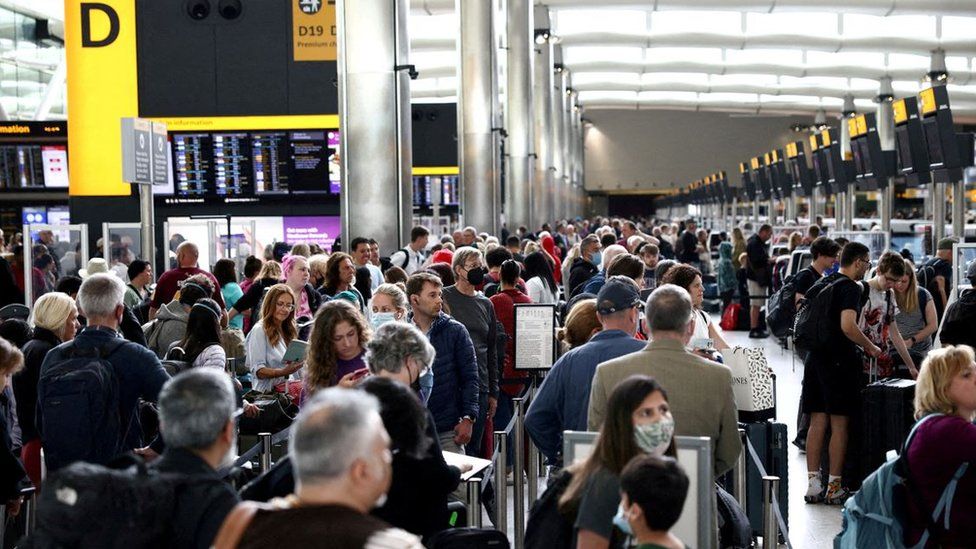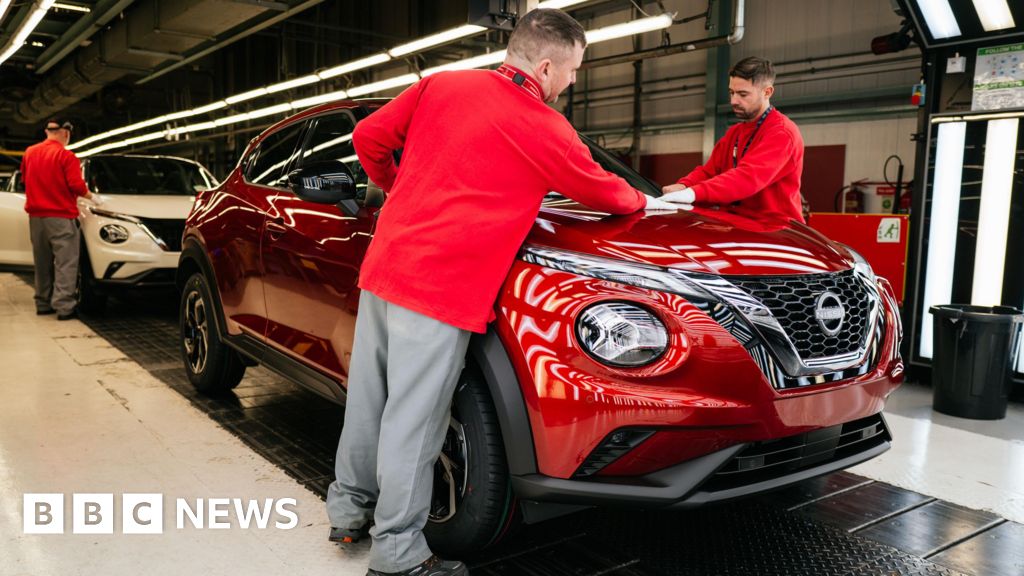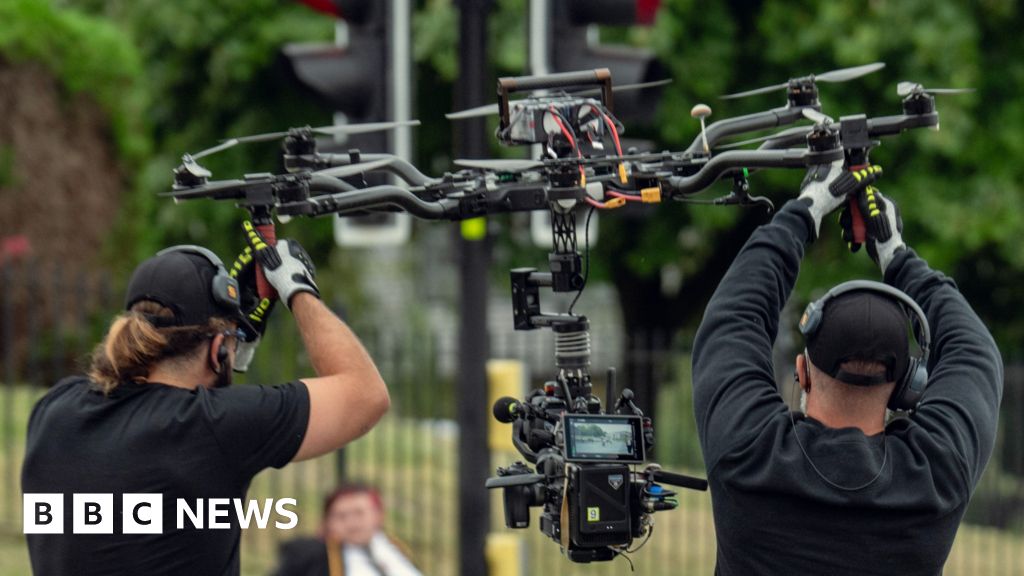ARTICLE AD BOX
 Image source, Reuters
Image source, Reuters
Busy airports have become a familiar sight this year.
The summer tourist season is under way, with some people travelling abroad for the first time since the Covid pandemic. But what is causing chaos at some UK airports?
BBC News has spoken to a number of airline workers anonymously over the last few weeks.
We got the inside story from front-line staff, including pilots, baggage handlers and cabin crew.
Here's what they had to say about what's going on behind the scenes and how the airport and airlines have responded to them.
'The system is way too slow'
A British Airways cabin crew member based at Heathrow Airport told the BBC that most long-haul flights are operating short of crew, which has a knock-on effect on staff tiredness.
Though flights are still crewed above the legal minimums, he said the company was "recruiting like mad to fill the gaps". This can be a lengthy process, with delays to processing airside passes slowing things down.
"Whether it's us, or baggage handlers, we have to go through so much security checking in advance of employment. The system is way too slow."
He said team morale was a "mixed bag", with most happy to be flying with customers again.
However, he described the negative feeling that sets in for cabin crew, as the plane descends into Heathrow. "You used to land and think '30 minutes later I'll be on the way home'. Now, it's 'how long will this go on for?'."
He says that a shortage of airport workers and cleaners is behind delays in getting passengers and crew off the plane, including people who use wheelchairs.
"None of us feel we can walk off the plane and leave people. It's a huge security risk. I'm sick to death with delays to that sort of thing."
British Airways told BBC News: "We're grateful for the hard work of our colleagues whose wellbeing is extremely important to us and we are doing everything we can to support them during this busy time, while still providing the best service to our customers."
Image source, Reuters
Image caption,Throughout the summer, pictures of baggage piled up at airports has become a common sight.
Another senior cabin crew member at a major airline operating out of Heathrow said pressure on staff to redress the backlogs made things worse.
"Stress is leading to a high sickness rate and absenteeism. Stand-by cover has been reduced, which can lead to flight cancellations, even a couple of hours before a plane is due to depart.
"We're flying our socks off to the legal minimums and maximums, and so many of the staff are new that it's much harder. We have to do half their jobs and it's not what they were expecting, so they often just leave.
"Customers are so rude and that can be a lot to take when it's someone's first real job."
'The chances of your bag making it are very slim'
A ground baggage handler, who has worked at Heathrow for 12 years, described the situation as "a shambles".
"Imagine a duck paddling on water; it's manic," he told the BBC.
"There are not enough baggage belts for the amount of flights. You could be waiting half an hour for a belt when a flight comes in. Within that half an hour, another flight will come in, which makes it 10 times worse. It's disheartening when you walk out and see all the passengers."
In more than a decade of ground handling, he says he has never seen things this bad, including when ash from an Icelandic volcano grounded planes in 2011.
He feels the problems stem from a lack of investment - on top of recruitment problems - and added that some baggage is sorted on a system that is about 40 years old.
"This is like a really bad snow day, but three months of it," he says. "The school holidays will be worse. I'm petrified to go on holiday. I would not want to be transferring now - the chances of your bag making it are very slim."
A spokesperson for Heathrow Airport said: "We recognise that the baggage system in T2 is old - that's why we want to replace it and have urged the CAA [Civil Aviation Authority] to allow us to invest in a new system as part of the next regulatory settlement.
"There is no shortage of airport workers - all parts of the airport are operational and we have the same capacity in security as summer 2019.
"We aren't responsible for airline ground handlers or air crew - both work directly for airlines."
The summer holidays will be a key test for an industry scarred by the impact of Covid.
To try to better match demand to available resources, schedules and ambitions have been trimmed - in some cases, slashed - and some airports have placed limits on flight or passenger numbers.
The calculation is that this sort of advance disruption is better than last-minute, on-the-day delays and cancellations.
Will it be enough to ensure things do go smoothly?
Some businesses appear to have done much better than others on the staffing front, and some airlines have made far fewer cancellations than others.
Airports say they have recruited hundreds of new security officers.
But aviation is a complex ecosystem, involving many different teams - and businesses.
There are still some staffing weak spots, for example among ground handlers.
Generally, firms say they have done what they can to minimise the chances of further disruption and delays, and they are focused on getting people away for their long-awaited holidays. But no-one can promise a completely hitch-free summer.
Image source, PA Media
Image caption,Airport staff have told BBC News that they believe there has been a lack of forward planning ahead of the summer holidays.
'I got a round of applause and high-fived'
"This year airports are more chaotic than usual," according to a pilot, who has worked for Virgin Atlantic for decades.
He said staff have their own security queues which have been longer than normal and presumes that is because there are fewer staff. He added that passenger queues have been longer this summer, with some people even queueing outside.
"Passengers seem to realise the stress the industry is suffering. I was called out from stand-by to take a flight for which we had no captain. Passengers had been waiting for an hour or so past the departure time at the gate. I got a round of applause and high-fived."
He said cabin crew are telling him that passengers are in good spirits once they are under way but staff themselves are stressed. Cabin crew are working at or near minimum cabin manning levels with pilots experiencing fatigue.
"I feel the company has adopted a hostile working culture," he said.
A Virgin Atlantic spokesperson said: "Due to airside ID referencing delays for new crew members, we've recently operated some flights with fewer cabin crew than would typically be on board.
"The crew complement on all flights fully adheres to the strict safety regulations stipulated by the CAA.
"We recognise the challenges that Heathrow Airport and the wider aviation ecosystem faces this summer and apologise to any of our customers who have been affected by longer wait times or sticking points in their journey."
'Everything gets cut to the bone'
Another pilot, who is taking a break from the industry, told us: "My experience of the aviation industry is of a gradual decline, with periods of chaos due to that decline and not being prepared."
He added that the current problems are effects of decisions made since the start of the Covid pandemic, with no thought of the increased demand for travel afterwards.
However, his biggest criticism lies with the drive for low prices and big profits where "everything gets cut to the bone and during unusual times it will mean system breakdown".
Story by Hayley Clarke, James Kelly, Kris Bramwell, Victoria Park and Bernadette McCague.
Have you been affected by the issues raised in this story? Please get in touch by emailing: haveyoursay@bbc.co.uk.
Please include a contact number if you are willing to speak to a BBC journalist. You can also get in touch in the following ways:
If you are reading this page and can't see the form you can email us at HaveYourSay@bbc.co.uk. Please include your name, age and location with any submission.

 2 years ago
79
2 years ago
79








 English (US) ·
English (US) ·